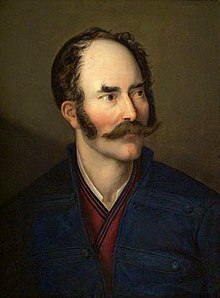Sima Milutinović Sarajlija
| Sima Milutinović Sarajlija | |
|---|---|
 |
|
| Born | Simeon Milutinović 3 October 1791 Sarajevo, Bosnia Eyalet, Ottoman Empire |
| Died | 30 December 1847 (aged 56) Belgrade, Principality of Serbia, Ottoman Empire |
| Pen name | Simeun Milutinov, Simeun Mil. Simović, Simša M. Sirotan, Simo Milutinović, Čubro Čojkovič, Čubro Čojković-Crnogorac, Srbo Srbović, S. M. Crnogorac, Si. M. Saraj. Černogo. Herak, S. M. Simović, Č.Č.Č. Exauditus |
| Occupation | Poet, hajduk, translator, historian, philologist, diplomat. |
| Nationality | Serbian |
| Literary movement | Romantism |
Simeon "Sima" Milutinović "Sarajlija" (Serbian Cyrillic: Сима Милутиновић "Сарајлија", pronounced [sǎːʋa milutǐːnɔʋit͡ɕ sarǎjlija]) (3 October 1791 – 30 December 1847) was a Bosnian Serb poet, hajduk, translator, historian, philologist, diplomat and adventurer.
From his birth his life was a constant adventure. It began with his family's flight from the plague and the Turks. Its zenith came during the Serbian insurrections, and it ended in the unmatched glory of a poet and his grandiose political plans.
Sima Milutinović was born in Sarajevo, Ottoman Empire in 1791, hence his nickname Sarajlija (The Sarajevan). His father was from the village of Rožanstvo near Užice, which he left running away from the plague and eventually settled in Sarajevo long enough to marry a famed town beauty Anđelija Srdanović who is Sima's mother.
Sima wasn't even two years of age when another plague outbreak hit Sarajevo. The family fled the town, seeking refuge on several locations in Bosnia, before going to Slavonski Brod, before ending up in Zemun where Sima commenced primary education but never completed it. He then attended school in Szeged (Hungary) and was later expelled from gymnasium in Sremski Karlovci.
During the First Serbian Uprising he was a scribe in Karađorđe's Governing Council (Praviteljstvujušći Sovjet). Sarajlija laid Dositej Obradović to rest and joined a guerilla band, commanded by hajduk Zeka Buljubaša. It was in the heat of battles with Ottoman Turks that his first poems germinated. They were not revolutionary odes, however, but love songs. They were inspired by his first great love - Fatima, a Turkish girl. After the collapse of the First Serbian Uprising he was a hajduk and teacher in Vidin. He also spent a year or two in a Turkish dungeon. After evading the Turks, he went to Chişinău (then part of Russia), where he remained, long enough to write The Serbian Maid. It is said that he sent reports to confidants of Miloš Obrenović I, Prince of Serbia concerning Karađorđe's followers in exile. This did not keep him later from turning against the Obrenović faction. In 1825 he went to Germany where he enrolled in the University of Leipzig, though he did not tarry there. Instead, a year later, he went back to Serbia to be a clerk in the employ of Prince Miloš but on arriving in Zemun, however, he turned about and went to Trieste, Kotor, and then Cetinje.
...
Wikipedia
